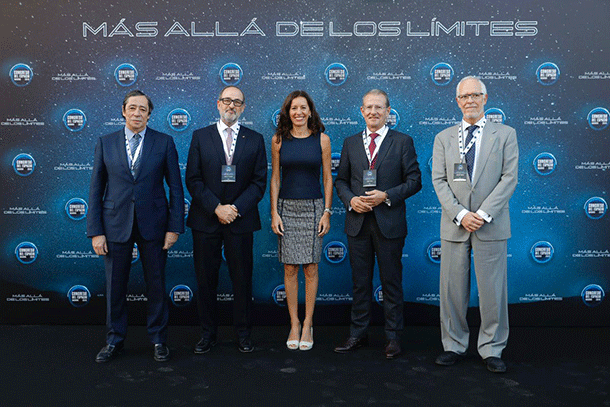GMV features prominently at the Space Congress

On 9 and 10 October Madrid hosted the Space Congress, the must-attend event for finding out about the current situation of Spain’s space sector and its future prospects. The venue was the conference center called Complejo Duques de Pastrana, attracting a total turnout of about 450.
Promoted by the Spanish Association of Space, Aeronautics and Defense Technology Companies (Asociación Española de Empresas Tecnológicas de Defensa, Aeronáutica y Espacio: TEDAE), with the organizational collaboration of the National Aerospace Technology Institute (Instituto Nacional de Técnica Aeroespacial: INTA), the Higher Scientific Research Center (Consejo Superior de Investigaciones Científicas: CSIC), the Industrial Technology Development Center (Centro para el Desarrollo Tecnológico Industrial: CDTI) and Spain’s Ministry of Defense and Ministry of Public Works, the Space Congress brought together for the first time ever in Spain the most renowned professionals from industry, universities, public organizations and other institutions to set up a common dialogue forum for discussing sector capabilities, current challenges, goals and the opportunities of the upcoming years.
The opening address was given by the Presidency Councilor of Madrid Region, María Eugenia Carballedo, while the closing address was given by the acting Minister of Science, Innovation and Universities, Pedro Duque.
The congress, geared towards the national and European space community, aimed to «push back the limits» of technology, innovation, science and knowledge. The program comprised several discussion panels and featured top speakers, tackling such issues as space exploration, satellite navigation, earth observation, the role of the space industry in the digital and communications society, space technologies and uses in defense and security, space’s likely role in society within a 2030-2040 timeframe and Spain’s leadership role at European and world level, plus the necessary technological advances to achieve all these goals. All these matters are bound up with the European Union’s space strategy and the specific outlook of the European Space Agency (ESA) ahead of its November Council at Ministerial Level (Space19+) to be held in Seville.
GMV’s Space General Manager, Jorge Potti, took part in the discussion panel “Satellite Navigation: The Great Revolution”, chaired by the Secretary General of Transport of Spain’s Ministry of Public Works, María José Rallo del Olmo and with the participation of leading figures from the European Commission, ESA, GSA, the Spanish Ministry of Defense, INTA and Spain’s air navigation services provider, ENAIRE.
Jorge Potti’s speech dwelt on the industrial and economic development potential of the Galileo program, the flagship of the European Union’s space program. Galileo is a basic global infrastructure and a driving force of Europe’s economy. In Potti’s words, “Galileo represents the EU’s first infrastructure, making satellite navigation one commodity more, as necessary as water, electricity, communications, etc.”. Over the coming years we will see more and more of its applications coming on stream, especially ground developments in the automotive and railway sectors. “Without any doubt,” Potti added “we are about to live through a veritable revolution in road-transport, with the introduction of the connected vehicle and autonomous driving”.
The event featured standout speakers from top space companies, institutions and organizations at national and European level, including the Secretary General for Coordination of Scientific Policy of the Ministry of Science, Innovation and Universities, Rafael Rodrigo; ESA’s Director General, Johanne-Dietrich Wörner; the Executive Director of the European GNSS Agency (GSA), Carlo des Dorides; the Adviser – EU Satellite Navigation Programmes, Augusto González, and the Director General of the CDTI, Javier Ponce.
On the second day of the congress, before the closing ceremony the Secretary General of Industry and SMEs of the Ministry of Industry, Trade and Tourism, Raül Blanco, presented the Sector Agenda of the Space Industry, a roadmap designed to guide Spain’s space industry towards its best possible development in the coming years. The agenda has been drawn up by TEDAE’s Space Committee in close collaboration with the Ministry of Industry, Trade and Tourism and the Ministry of Science, Innovation and Universities. The TEDAE President, Jaime de Rábago, then fleshed out the details of this agenda.
In his speech Raül Blanco argued that the space sector “is one of the main driving forces of our present and future economic growth and technological prowess. Apart from its main impact on the economy it also has innumerable knock-on effects that ripple through other sectors and providers of enabling technologies” with companies like GMV to the fore.
A surprise guest during Pedro Duque’s closing address was the recent winner of the Nobel Prize for Physics, Michael Mayor, who happened to be in Spain at the time. Mayor remained seated among the audience for a few minutes while the minister announced the famous physicist, recognized as one of the first discoverers of planets outside the solar system. Mayor then received a resounding ovation from the floor.